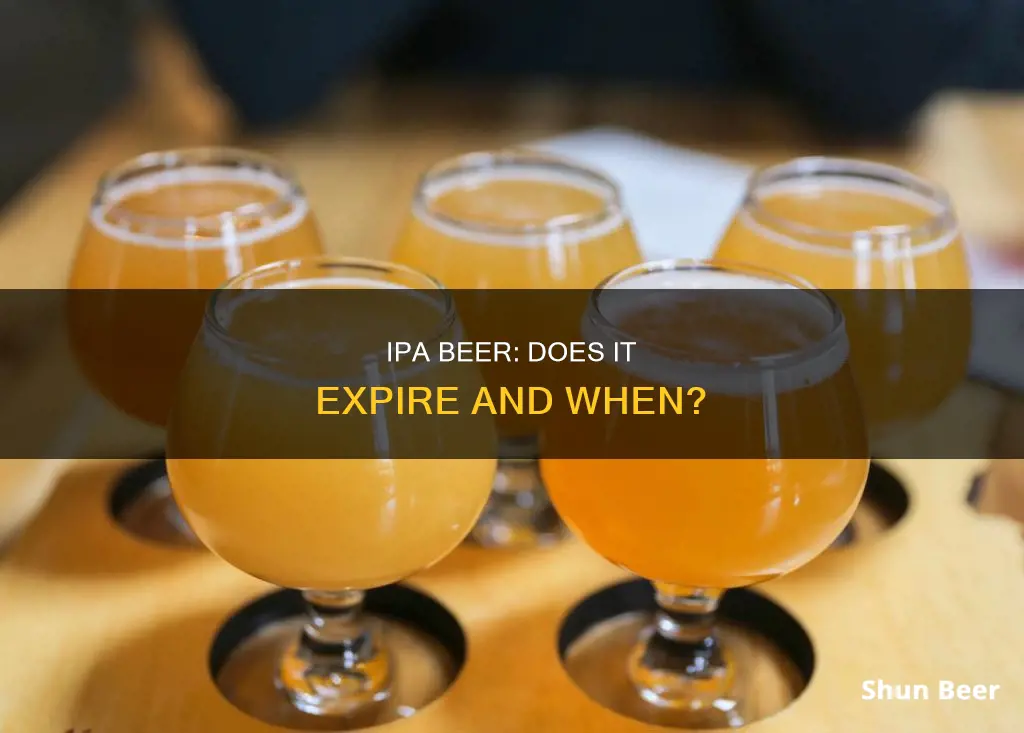
Beer doesn't spoil or go bad in the same way that food does, but it can expire. While it's generally safe to drink beer past its best by date, the taste will change over time—and not necessarily for the better. This is especially true for IPAs, which are more sensitive to the effects of time because of their high hop content.
| Characteristics | Values |
|---|---|
| Expiry | IPAs do not pose health risks upon expiry, but their flavour profile changes over time. |
| Flavour | IPAs are best consumed within three weeks of production for optimal flavour. Their flavour can diminish and turn malty or caramel-flavoured within three months. |
| Factors Affecting Flavour | Exposure to ultraviolet light, heat, and oxygen can cause IPAs to lose their flavour. |
| Storage | IPAs should be stored in a cool, dark place, preferably in a refrigerator, and kept at a consistent temperature. |
| Packaging | Canned IPAs are better for long-term storage than bottled IPAs as they prevent light from entering and maintain an airtight seal. |
What You'll Learn

IPA flavour diminishes over time
IPAs are highly susceptible to flavour deterioration due to their generous use of hops, which is what gives the beer its distinctive bitter taste, aroma, and flavour. When hops are exposed to ultraviolet light, heat, and oxygen, they begin to lose their flavour-enhancing power, causing the IPA to taste muted or malty.
The flavour of an IPA can start to diminish within two weeks of carbonation, and after three weeks, it may taste like a bitter. The hops aroma will drop off with age, and the beer will become less flavourful, with only bitterness remaining.
Oxidation is another factor that affects the flavour of IPAs. Although craft brewers try to prevent it, trace amounts of oxygen can sneak into packaged beer. Over time, oxygen can flatten carbonation, create off-flavours, and weaken the hop character of IPAs.
To preserve the flavour of IPAs, it is essential to minimise their exposure to oxygen and keep them cold, ideally between 38 and 50 degrees Fahrenheit. Consuming IPAs as soon as possible after production, preferably within three weeks or, at most, three months, will ensure the best flavour experience.
The Brewing Process: Guinness Beer Filtration Techniques
You may want to see also

IPAs are sensitive to ultraviolet light, heat, and oxygen
Ultraviolet (UV) light is a type of electromagnetic radiation with wavelengths shorter than visible light but longer than X-rays. The sun is the strongest source of UV radiation in our environment, and it can cause harm to humans and beer alike. In the case of beer, UV light can cause a chemical reaction that results in the familiar and funky smell of skunk. This is why it is recommended to store beer away from direct sunlight and to avoid buying beer that has been exposed to UV light, such as those stored near windows or under fluorescent lights.
Heat is another enemy of IPAs. To maintain optimal flavour, beer should be stored in a cool, consistent environment, preferably between 38-50°F (3-10°C). Keeping beer cold also slows down the degradation process, helping to preserve its freshness. Warmer temperatures can accelerate this process, causing the beer to lose its intended flavour more quickly.
Oxygen is the third factor that can negatively impact IPAs. Although craft brewers take precautions to minimise oxygen exposure, trace amounts can still sneak into packaged beer. Over time, oxygen can cause a variety of undesirable effects, such as flattening carbonation, creating off-flavours, and weakening the hop character that is characteristic of IPAs. This is why canned beer is often preferred for long-term storage, as it maintains an airtight seal better than bottled beer.
By understanding the sensitivity of IPAs to ultraviolet light, heat, and oxygen, beer enthusiasts can take the necessary steps to preserve the flavour and freshness of their favourite brews. Proper storage conditions, such as keeping beer cold and away from direct sunlight, can help extend the enjoyment of IPAs and ensure a more pleasant drinking experience.
Football Stars in Guinness Beer Ads: Who's Featured?
You may want to see also

IPAs are best consumed within three weeks
The change in flavour is due to a process called oxidation, which is caused by oxygen interacting with the compounds from malt, yeast and hops. This causes a disappointing papery taste. While IPAs can be consumed well after three weeks, the longer you wait, the more the flavour will deteriorate.
To slow down this process, it is recommended to store IPAs in a cool, dark place, preferably a refrigerator. If you are storing at room temperature, make sure the beer is not exposed to sunlight. It is also best to store the beer standing upright, as this allows for less exposure to oxygen than when the bottle or can is placed on its side.
If you are purchasing IPAs, it is best to buy from stores that have a high turnover of beer and keep the beer cold throughout its shelf life. It is also worth noting that wet hop IPAs, which use fresh hops, are even more sensitive to time than regular IPAs and should be consumed within three weeks to enjoy their unique, fresh taste.
Guinness' Surprising Health Benefits Over Other Beers
You may want to see also

IPAs are best stored in a cool, dark place
Temperature plays a crucial role in preserving the freshness of IPAs. Warm environments and direct sunlight can accelerate the degradation process, causing the beer to lose its intended flavour more quickly. Keeping IPAs cold, generally between 38-50°F, slows down this process and helps maintain their optimal condition.
In addition to temperature control, protecting IPAs from direct sunlight is essential. Exposure to ultraviolet (UV) light can cause chemical changes in the beer, resulting in flavour deterioration and the production of undesirable compounds. By storing IPAs in dark places, you can minimise the impact of UV light and preserve their intended flavour profile.
The ideal storage conditions for IPAs are similar to those for other types of craft beer. Keeping the beer cold and away from direct sunlight helps to maintain its freshness and prevent oxidation, which can affect the flavour and overall drinking experience.
It is worth noting that even when stored in optimal conditions, IPAs have a relatively short shelf life compared to other beers. The hops used in IPAs are more susceptible to oxidation, and the flavours can start to diminish within three weeks from the date of production. Therefore, it is recommended to consume IPAs as soon as possible after purchasing to fully appreciate their unique characteristics.
Guinness Nitro Beer: What Are Those IBUs?
You may want to see also

IPAs are not harmful to consume after their best by date
IPAs, like other beers, do not expire in the traditional sense. They are safe to consume long after their "best by" date. However, the flavour and quality of IPAs can diminish over time, especially if they are not stored properly.
IPAs are more susceptible to flavour degradation than other beers due to their high hop content. Hops are responsible for the bitterness, flavour, and aroma characteristic of IPAs. When exposed to ultraviolet light, heat, and oxygen, the hops in IPAs can lose their flavour-enhancing power, resulting in muted or less agreeable flavours.
While IPAs are best enjoyed within three weeks of production for optimal freshness, they can retain their flavour for up to three months. After this period, the hop profile may mellow out, resulting in maltier or caramel-like flavours.
To ensure the best quality and flavour integrity of an IPA, it is recommended to purchase from stores dedicated primarily to beer, as they tend to have faster inventory turnover. Additionally, look for IPAs that have been stored cold throughout their shelf life, as cold temperatures slow degradation.
While IPAs are best enjoyed fresh, they can be safely consumed past their "best by" date. However, the flavour and sensory experience may not be as intended by the brewer.
Guinness Beer: Available in Kolkata?
You may want to see also
Frequently asked questions
Yes, IPA beer can expire, but it won't make you sick. The fresher the beer, the better it will taste. IPAs are best consumed within 3 weeks to 3 months of production.
Check the bottom of the can or the bottle label for a "born on" date. If there is no date, look for a best by date or an enjoy by date. If you can't find any dates, check if the beer has lost its fizz or developed a vinegary taste—these are signs that your beer has expired.
Expired IPA beer won't make you sick, but it might not taste very good. The wonderful hoppy aroma of an IPA will dissipate over time, and the beer may develop off-flavors like wet cardboard or skunkiness.







